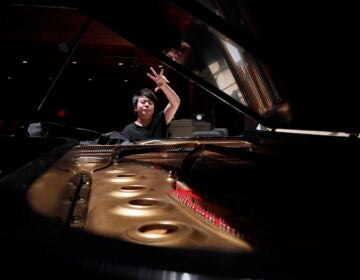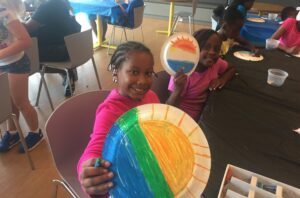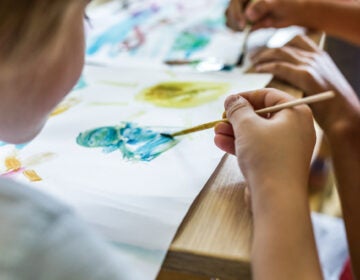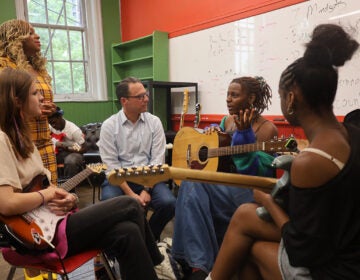Studies show links between arts programs and positive academic outcomes, skills
Anecdotal evidence has shown arts-related classes lead to better grades.
Listen 1:57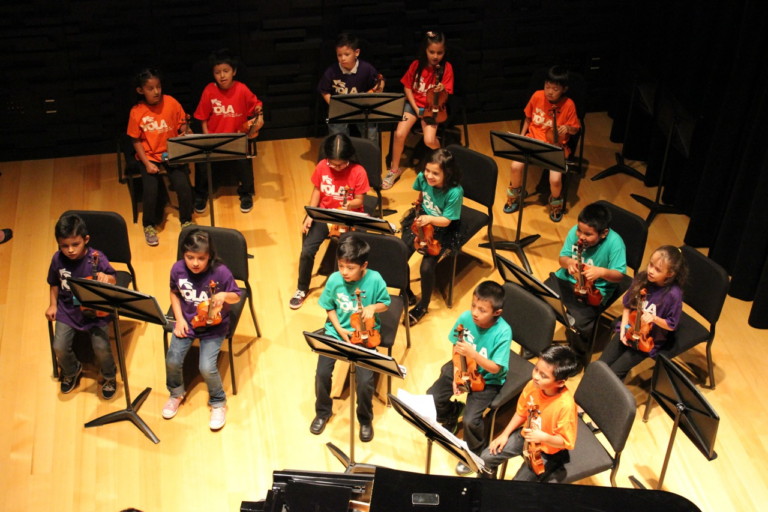
Group of Los Angeles students who participated in the music program that was a partnership between the Los Angeles Philharmonic Orchestra and the Heart of Los Angeles, a nonprofit group. (Courtesy of USC Brain and Creativity Institute)
From Philly and the Pa. suburbs to South Jersey and Delaware, what would you like WHYY News to cover? Let us know!
For years, researchers have documented the positive impact of arts programs when it comes to students’ self-esteem, wellbeing and interpersonal skills – and good citizenship. Now, it seems, they also impact overall academic success.
In two expansive studies, one in Miami and the other in Los Angeles, researchers followed hundreds of public-school students, some who took arts-related or music courses starting in their early grades and others who did not.
Their findings showed that the students exposed to arts-related programs, such as music, demonstrated positive academic outcomes or improved skill development, compared to those who didn’t participate.
In Los Angeles, about 75 students, starting at ages 6 and 7, underwent a comprehensive battery of behavior tests, including MRIs and other brain measurement technology, at the University of Southern California Dornsife Brain and Creativity Institute. The students were divided into three groups of 25. One group participated in a music program, another a sports program. The third group was not involved in any extracurricular activities. The students were mostly Hispanic and from similar socioeconomic backgrounds.
The group in the music program showed improvement in cognitive, memory and impulse control, said Assal Habibi, an associate professor of psychology and neurology at University of Southern California who was one of the researchers.
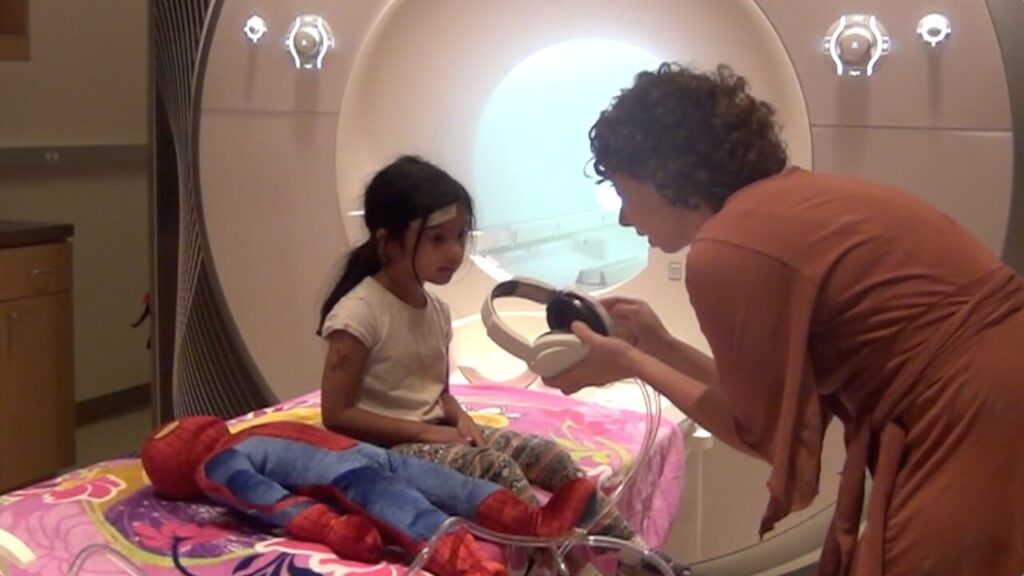
Habibi said she was not surprised by the link between arts programs and academic achievement.
“The motivation for this study came from the observation and anecdotal evidence that we had that music training can support child development in positive ways,” Habibi said. “So we wanted to go back and see how these skills develop over time.”
Bigger study, positive correlations
In the Miami-Dade school system, researchers followed a much larger group, 80,000 public school students from fourth grade through high school, for more than a decade. The study revealed that students who took arts-related classes had much better math and reading scores in the sixth, seventh and eighth grades compared to those who did not take art classes. The students came from diverse races and backgrounds. The classes included dance, drama, music and visual arts.
The findings were published in the Psychology of Aesthetics, and the Arts, a journal of the American Psychological Association, in 2019.
“Those who experienced arts electives in middle school went on to earn significantly higher grade point averages and higher standardized math and reading test scores, and were less likely to get suspended from school,” according to the report.
In yet-to-be published research, Adam Winsler, a psychologist and professor at George Mason University and a lead researcher, said students who participated in arts programs were more likely to graduate from high school and less likely to be suspended from school, compared to their counterparts who did not take arts classes.
There are several theories on why arts translated into better academic achievement and greater school engagement for the Miami students, Winsler said.
“You are listening and coordinating with others, you are monitoring and regulating your own behavior,” Winsler said. “All of these are useful things in the academic world, as well as artistic development.”
But Winsler said there are other factors, as well.
“There is also a social mediation, social bonding and friends network groups. People helping each other out in academics,” Winsler said. “People might be studying together, more engaged and socially bonded with the school through the arts. It could be what is motivating them to stay in school.”
The study started in 2002 and lasted more than a decade. It included five groups of fourth graders. In 2020, the last of the students graduated from high school.
The study was funded in part by the National Endowment of the Arts, and supported by the Early Learning Coalition of Miami-Dade/Monroe and the Children’s Trust.
Grades and standardized test scores were recorded by Miami-Dade County Public Schools and reported to the researchers without identifying the students.
Starting in 2012, USC Dornsife Brian Creativity Project followed a group of public school students for five years. The study was a partnership between the university, the Los Angeles Philharmonic Orchestra and the nonprofit Heart of Los Angeles.
The study was funded by the National Center of Complementary and Integrative Health.
“We wanted to choose a group of children and a music training program that is offered at a community level specifically for children who typically do not have access to music as part of their school curriculum and education,” said Habibi, the researcher.
Each year, the students underwent a comprehensive battery of tests. The researchers measured cognitive, language and memory abilities, together known as executive function skills.
“We were looking at their social, emotional development – looking at skills such as compassion, empathy and prosociality,” Habibi said.
The researchers were not surprised that students’ basic music ability improved. They got better at things like pitch, perception, rhythm and singing.
“More interestingly, we saw changes in a series of skills and abilities that we refer to as executive function,” Habibi said. “So these skills are very important and have been shown to lead to success in life in general, better relationships and better academic achievement. These are the building blocks of academic achievement.”
Educators say these developed skills, along with others learned in the arts — such as the ability to accept criticism, pay attention to detail, discipline and teamwork — tend to lead to better performance in the classroom and ultimately career success, even if it’s not in the arts.
Arts are important
In its strategic plan, the Philadelphia School District identified the importance of the arts, saying it wanted to make sure that all students received a well-rounded education that includes the arts. The district spends about $60 million a year on the arts. The district’s proposed budget for 2025-26 is $4.6 billion.
In the 10 Philadelphia schools that are part of the Lang Lang International Music Foundation program that teaches piano lessons to third and fourth graders, the foundation reported anecdotal evidence from teachers’ progress reports that students in the program showed improvement in math and reading grades.
“We are seeing a lot of correlational evidence from around the world,” said Ilari Beatriz, a USC professor of music and one of the researchers. “There are studies from Japan, there are studies from Turkey and different places where we do see links between arts participation and academic achievement. The more time students spend in the arts, the stronger these links seem to be.”
Editor’s Note: This story is part of a series that explores the impact of creativity on student learning and success. WHYY and this series are supported by the Marrazzo Family Foundation, a foundation focused on fostering creativity in Philadelphia youth, which is led by Ellie and Jeff Marrazzo. WHYY News produces independent, fact-based news content for audiences in Greater Philadelphia, Delaware and South Jersey.

Get daily updates from WHYY News!
WHYY is your source for fact-based, in-depth journalism and information. As a nonprofit organization, we rely on financial support from readers like you. Please give today.


